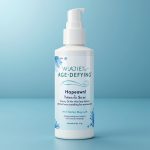Introduction
We’ve all heard the advice: drink more water for better skin. But how much of it is true? In a world full of beauty tips and health trends, it can be overwhelming to separate fact from fiction. In this article, we’ll dive into the relationship between water and skin hydration, uncovering the truth behind this popular belief. So, grab a glass of water and let’s sip smart!
Understanding Skin Hydration
Before we explore the role of water in skin hydration, it’s important to understand what skin hydration actually means. Skin hydration refers to the water content in the skin, which affects its elasticity, suppleness, and overall appearance. When skin is well-hydrated, it appears plump and healthy. On the contrary, dehydrated skin can look dull, flaky, and more prone to wrinkles.
How Does Water Affect Skin?
Water plays a crucial role in maintaining skin health, but it’s not the only factor at play. Here are some ways water impacts your skin:
- Cell Function: Hydrated skin cells function better. They can repair themselves more effectively and maintain the skin’s barrier, preventing moisture loss.
- Elasticity: Adequate hydration helps maintain skin elasticity. This means less sagging and fewer wrinkles as you age.
- Natural Glow: Well-hydrated skin reflects light better, giving it a natural, healthy glow.
How Much Water Do You Really Need?
The common recommendation is to drink eight 8-ounce glasses of water a day, also known as the “8×8 rule.” However, hydration needs can vary based on several factors, including:
- Activity Level: If you exercise frequently, you’ll need to drink more water to replace fluids lost through sweat.
- Climate: Hot or humid weather can increase your hydration needs.
- Diet: Foods with high water content, such as fruits and vegetables, contribute to your daily hydration.
It’s essential to listen to your body. Thirst is a natural signal that you need to hydrate, so pay attention to it.
Water vs. Moisturizers: What’s the Difference?
While drinking water is vital for hydration, it’s crucial to understand that it doesn’t directly moisturize your skin. Instead, water hydrates your body from the inside out. On the other hand, moisturizers work by creating a barrier on the skin’s surface to lock in moisture. Here’s how they complement each other:
- Hydration: Drinking water hydrates your skin cells, making them healthier and more resilient.
- Moisture Retention: A good moisturizer helps trap that hydration in, preventing it from escaping.
For optimal skin health, it’s essential to combine both adequate water intake and the use of quality moisturizers.
Other Factors Influencing Skin Hydration
Water consumption is just one piece of the puzzle. Here are other factors that can significantly impact your skin’s hydration:
- Humidity: Low humidity levels can lead to dry skin, while higher humidity levels can help keep it hydrated.
- Skincare Products: Some products, especially those with alcohol or fragrances, can strip moisture from your skin.
- Diet: A diet rich in antioxidants, vitamins, and healthy fats can support skin health and hydration.
- Sleep: Quality sleep is essential for skin repair and hydration.
Tips for Staying Hydrated
Here are some simple tips to help you stay hydrated and support your skin health:
- Carry a Water Bottle: Keep a reusable water bottle with you to remind yourself to drink water throughout the day.
- Eat Water-Rich Foods: Include fruits and vegetables like cucumbers, watermelon, and oranges in your diet.
- Set Reminders: Use your phone to set reminders to drink water, especially if you tend to forget.
- Monitor Your Urine Color: A light yellow color typically indicates proper hydration, while darker urine may signal dehydration.
Conclusion
In conclusion, while drinking water is essential for maintaining healthy skin, it’s not a magic solution. Adequate hydration, combined with a good skincare routine, a balanced diet, and healthy lifestyle choices, will yield the best results. So, sip smart, stay hydrated, and give your skin the care it deserves!




